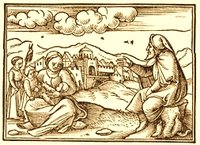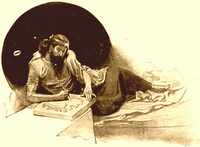Prophets
Q: What is a prophet?
A: In general terms, a prophet is a person who bears a message from a divine source to a mortal audience. In a Biblical sense, prophets spoke the messages given them by the Lord to rebuke, warn, comfort, or encourage their various audiences.
 Generally, the prophetic office involved a two-fold function. We normally think most about the predictive aspect: Prophets would be given glimpses of future events, some of which were guaranteed to happen, others which might change should the people repent of their present evil. This connects to the primary aspect: A true prophet always spoke God’s Word faithfully to an often faithless people.
Generally, the prophetic office involved a two-fold function. We normally think most about the predictive aspect: Prophets would be given glimpses of future events, some of which were guaranteed to happen, others which might change should the people repent of their present evil. This connects to the primary aspect: A true prophet always spoke God’s Word faithfully to an often faithless people.I’m not sure who invented the distinction, but I’ve often heard the description that prophets are involved in foretelling and forth-telling. Even if not making specific predictions, true prophets always plainly declared the Word and the will of the Lord, regardless of the consequences.
Perhaps the most succinct combination of foretelling and forth-telling came from Jonah as he rebuked and warned the Ninevites, “Yet forty days, and Nineveh shall be overthrown! (3:4)” In this same book, we clearly see God’s desire that people heed His warnings and be spared the doom He pronounces upon the unbelieving wicked: “When God saw what they did, how they turned from their evil way, God relented of the disaster that he had said he would do to them, and he did not do it. (3:10)”
While Jonah was angered that the Lord spared Ninevah the foretold catastrophe, it wasn’t because he thought that God acted unexpectedly. No, he prophesied knowing that the Lord’s mercy would be revealed. After God relented imposing judgment upon Ninevah, “It displeased Jonah exceedingly, and he was angry. And he prayed to the Lord and said, ‘O Lord, is not this what I said when I was yet in my country? That is why I made haste to flee to Tarshish; for I knew that you are a gracious God and merciful, slow to anger and abounding in steadfast love, and relenting from disaster.’ (4:1-2)”
 Along with speaking the Lord’s words, the prophetic proclamation also often included the performance of certain actions commanded by Him. With Hosea, his marriage to Gomer and the naming of their children declared God’s Word to Israel (see Hosea 1, etc.). Ezekiel’s prophecies included model building, binding himself, and eating (chapter 4), shaving (chapter 5), as well as word-play, riddle telling, and other oratorical skills.
Along with speaking the Lord’s words, the prophetic proclamation also often included the performance of certain actions commanded by Him. With Hosea, his marriage to Gomer and the naming of their children declared God’s Word to Israel (see Hosea 1, etc.). Ezekiel’s prophecies included model building, binding himself, and eating (chapter 4), shaving (chapter 5), as well as word-play, riddle telling, and other oratorical skills.Of course, the greatest Prophet was — and is — Jesus Christ. He purely proclaimed the full counsel of God and predicted many great and terrible events that would befall Jerusalem, Judea, and all the world. He is the One whom Moses anticipated: “The Lord your God will raise up for you a prophet like me from among you.... (Deuteronomy 18:15-22)” This passage also serves to clarify whose messages we should heed and whose we should reject.
Scripture quoted from The Holy Bible, English Standard Version™, © 2001 by Crossway Bibles.
Send email to Ask the Pastor.
Walter Snyder is the pastor of Holy Cross Lutheran Church, Emma, Missouri and coauthor of the book What Do Lutherans Believe.
Technorati Tags: prophets | foretelling | forthtelling | prophecy | prediction | proclamation | Law and Gospel | grace | Jesus | Jonah | Hosea | Ezekiel | Moses

0 Comments:
Post a Comment
<< Home